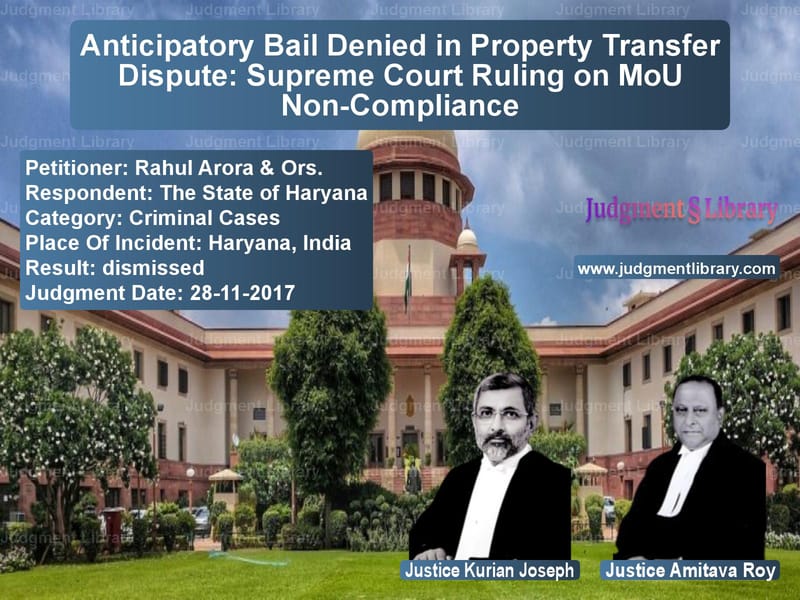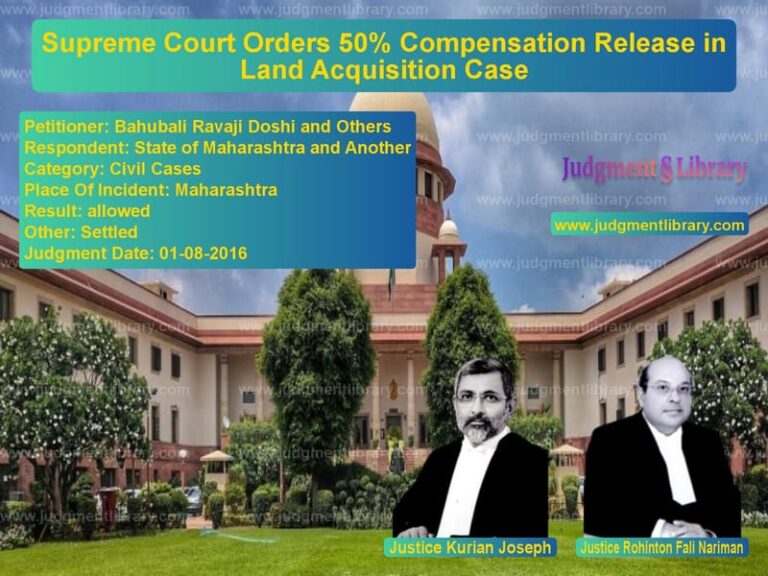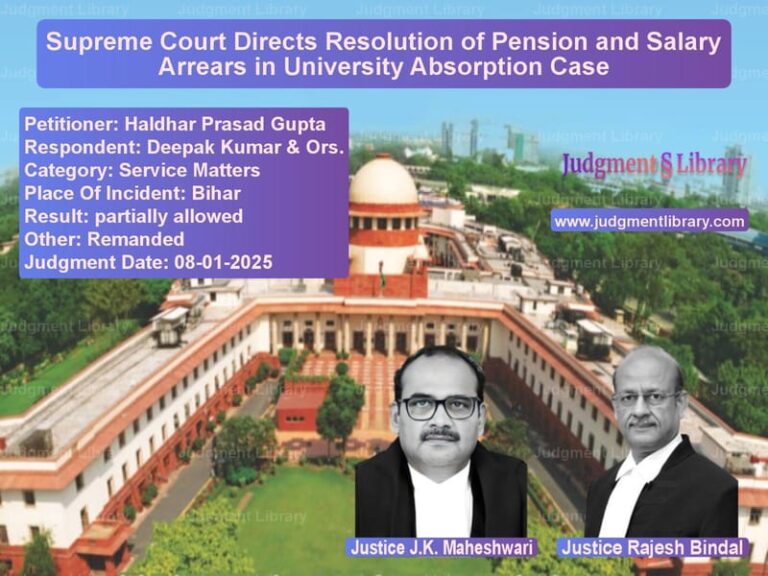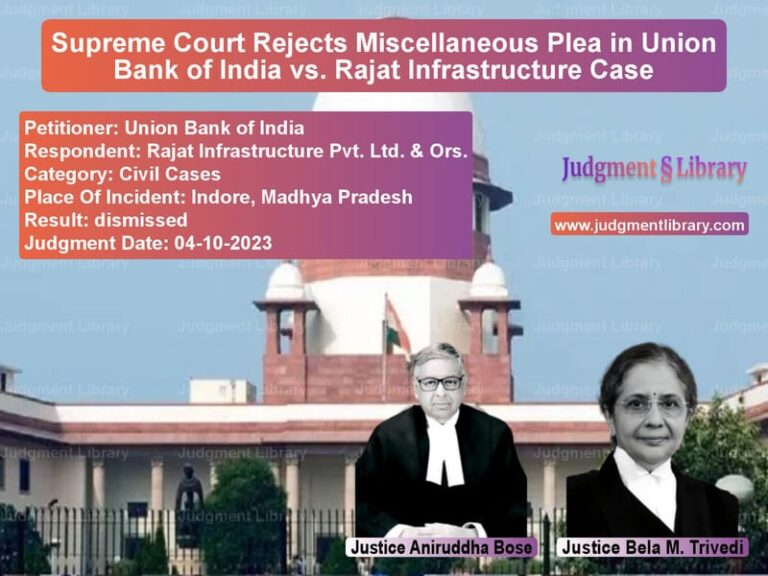Anticipatory Bail Denied in Property Transfer Dispute: Supreme Court Ruling on MoU Non-Compliance
The Supreme Court of India recently ruled on a significant criminal appeal in the case of Rahul Arora & Ors. vs. The State of Haryana, which revolved around the denial of anticipatory bail due to alleged non-compliance with a Memorandum of Understanding (MoU). The case was marked by accusations of dishonoring a legal agreement, leading to the rejection of bail by the Punjab & Haryana High Court. The Supreme Court’s ruling reinforced the importance of honoring court commitments and the consequences of failing to comply with a legal settlement.
Background of the Case
The case arose when the appellants, Rahul Arora and others, entered into a legal agreement requiring them to transfer a property in favor of the minor son of the complainant. This property transfer was a part of a settlement to resolve a financial dispute between the parties. However, the appellants failed to honor the agreement within the stipulated time, leading to a legal battle.
The Punjab & Haryana High Court had denied anticipatory bail to the petitioners under Section 438 of the Criminal Procedure Code (CrPC), 1973, citing repeated delays and misrepresentation of facts before the court. The High Court ruled that the petitioners had sought multiple adjournments and failed to comply with the court’s orders, indicating a lack of good faith.
Aggrieved by the High Court’s decision, the appellants approached the Supreme Court, seeking protection from arrest.
Petitioner’s Arguments (Rahul Arora & Ors.)
The petitioners, represented by their counsel, made the following submissions before the Supreme Court:
- They had no intention to defraud the complainant and were willing to comply with the MoU.
- The delay in executing the property transfer was due to procedural and administrative hurdles rather than willful non-compliance.
- They had already initiated the process of transferring the property and needed some additional time to complete the formalities.
- Since they were actively working towards compliance, the High Court’s denial of anticipatory bail was harsh and unwarranted.
- They should be granted protection from arrest, as they had demonstrated bonafide intent to complete the property transfer.
Respondent’s Arguments (State of Haryana)
The State of Haryana opposed the petitioners’ plea and made the following arguments:
- The petitioners had been given multiple opportunities by both the trial court and the High Court to fulfill their obligations, but they had failed to do so.
- The petitioners had misled the courts by repeatedly stating that they would transfer the property, yet they failed to take concrete steps until the Supreme Court intervened.
- The High Court had correctly observed that the petitioners had scant regard for the court’s orders and were using legal proceedings to delay the inevitable.
- The anticipatory bail plea was rightly rejected, as granting bail would set a bad precedent and encourage others to defy legal agreements.
Supreme Court’s Proceedings
The Supreme Court considered the submissions and issued a series of orders over multiple hearings:
- On November 1, 2017, the Supreme Court directed the petitioners to produce proof of the property transfer, stating: “The learned counsel for the petitioners submits that given some time, he shall produce the Title Deed transferring the Farm House in favor of the son in terms of the agreement.”
- On November 15, 2017, the Court noted that while the petitioners had initiated the transfer, they had only done so after their statement before the Supreme Court, not before the High Court’s ruling.
- The Supreme Court, suspecting further delays, directed the petitioners to be personally present in court on November 28, 2017.
- On November 28, 2017, the Supreme Court reviewed the evidence and found that the property had finally been transferred and registered in the name of the complainant’s son.
The Court then disposed of the appeal, granting the petitioners permission to approach the High Court again for bail in light of the new developments.
Key Observations by the Supreme Court
During the proceedings, the Supreme Court made several critical observations:
- “The petitioners had made a commitment before the courts, and such commitments must be honored in a timely manner.”
- “Repeated adjournments and delays in compliance raise serious concerns about the petitioners’ bona fide intent.”
- “While anticipatory bail is a safeguard against arbitrary arrest, it cannot be used as a shield by those who seek to evade their legal obligations.”
- “Given the completion of the property transfer, the High Court may now consider the petitioners’ plea in light of the new circumstances.”
Key Takeaways from the Judgment
- Failure to honor legal commitments can lead to the rejection of anticipatory bail.
- Court orders must be complied with in a timely manner, and delays can be seen as an attempt to mislead the judiciary.
- The Supreme Court will not interfere when lower courts have acted within the law and provided multiple opportunities to comply.
- Good faith and prompt compliance with legal agreements are crucial when seeking judicial relief.
- The Supreme Court expects strict adherence to MoUs and similar settlement agreements.
Conclusion
The Supreme Court’s ruling in Rahul Arora & Ors. vs. The State of Haryana highlights the judiciary’s commitment to enforcing contractual and legal obligations. The case serves as a warning to individuals who seek anticipatory bail while failing to honor legal settlements. The judgment reinforces that misleading courts and delaying compliance can have serious consequences.
The ruling also underscores the principle that anticipatory bail should not be granted when petitioners have repeatedly violated their commitments before judicial forums. The Supreme Court’s decision aligns with the broader legal framework that promotes judicial integrity and ensures that court orders are not taken lightly.
Don’t miss out on the full details! Download the complete judgment in PDF format below and gain valuable insights instantly!
Download Judgment: Rahul Arora & Ors. vs The State of Haryana Supreme Court of India Judgment Dated 28-11-2017.pdf
Direct Downlaod Judgment: Direct downlaod this Judgment
See all petitions in Bail and Anticipatory Bail
See all petitions in Fraud and Forgery
See all petitions in Property Disputes
See all petitions in Judgment by Kurian Joseph
See all petitions in Judgment by Amitava Roy
See all petitions in dismissed
See all petitions in supreme court of India judgments November 2017
See all petitions in 2017 judgments
See all posts in Criminal Cases Category
See all allowed petitions in Criminal Cases Category
See all Dismissed petitions in Criminal Cases Category
See all partially allowed petitions in Criminal Cases Category







